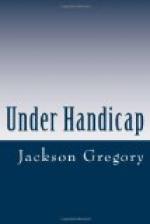“The strange part of it,” he thought, as he watched the bartender open his bottle of beer, “is where they get so much money! Do they make it out of sand?”
He invited the bartender to drink with him, chatted a moment, and then strolled over to the table. The dealer, a thick-set, fat-fingered, grave-eyed man who moved like a piece of machinery, glanced up at him and back to his game. There was no “lookout.” A man whom he had not seen before, deft-fingered and alert, was keeping cases. The proprietor of the hotel, the three cowboys, and one other man were playing.
Familiar with the greater number of common ways of separating oneself from his money, Conniston was no stranger to the ways of faro. He watched the fat fingers of the banker as they slipped card after card from the box, and smiled to himself at the fellow’s slowness. And before half a dozen plays were made his smile was succeeded by a little shock of surprise. It certainly did not do to judge people out here in a flash and by external signs. What seemed awkwardness a moment ago was now perfected, automatic skill.
The hotel man won and lost, his face always inscrutable, tilted sidewise as he closed one eye against the up-curling smoke from the cigar which he turned round and round between his pursed lips. He had in front of him a stack of ten or twelve twenty-dollar gold pieces which his fingers continually moved and shifted, breaking them into several smaller stacks, bringing them together again, slipping one over another, gathering them into one stack, breaking them down again, so that the golden disks gave out the low musical clink which rose at all times faint and clear through the few short-spoken words. And meanwhile his eyes never left the table and the box.
At the end of the sixth deal he coppered his bet and leaned back to light a fresh cigar. He stood already a hundred dollars to the good. One of the cowboys was winning, having taken in something like twenty or thirty dollars since Conniston came in. The other two were playing recklessly and with little skill, and were losing steadily. The fifth man contented himself with small bets.
Presently the younger of the two cowboys, the fellow whom Conniston had seen at the store in the afternoon, shoved his last two dollars and a half onto the table, lost, and got to his feet, shrugging his shoulders.
“Cleaned,” he grunted, laconically. “Gimme a drink, Smiley.”
He went to the bar with one lingering look behind him. And in another play or two his companion followed him.
“No kind of luck, Jimmie,” he said to the first to be “cleaned.” “Ain’t it sure enough hell how steady a man can lose?”
“Bein’ as my luck took a day off six months ago an’ ain’t showed up yet,” retorted Jimmie, “I guess I’d ought to had sense to leave inves’ments like the bank alone. Only I ain’t got the gumption. An’ I’m always figgerin’ it’s about time for my luck to git over her vacation an’ come back to work. How much did you drop, Bart?”




